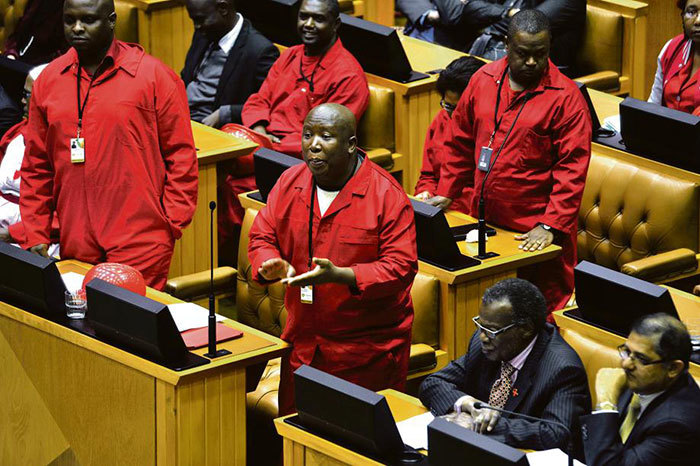Parliamentary stage set for more chaos in 2015
19 January 2015 | Story by Newsroom
All indications are that South Africans can expect more chaos and disruption between the hallowed walls of Parliament in 2015.
The Economic Freedom Fighters (EFF) have already fired the opening salvo with a recent letter to speaker Baleka Mbete, informing her that should she not call a special sitting of the legislature before President Jacob Zuma delivers his state of the nation address on 12 February, they would use the occasion to demand that Zuma answers questions about the R246-million upgrade to his Nkandla home.
Zuma has not appeared in Parliament to answer questions from the opposition since August last year, when chaos erupted in the National Assembly with EFF members of Parliament (MPs) demanding he "pay back the money" following the report of Public Prosecutor Thuli Madonsela. She found that the Zuma family unduly benefitted from the upgrades to his private Nkandla home.
Parliamentary rules specify that the president appear in Parliament once a term, or least four times a year, to answer questions. Professor Pierre de Vos, the Claude Leon Foundation Chair in Constitutional Governance at UCT's Faculty of Law, foresees either "a court or political challenge" to enforce this rule. "And given the politics around Nkandla and the awkwardness in having to answer questions about it, I suspect there is going to be some turmoil in the coming year."
He is however curious as to how EFF MPs will conduct themselves in the Parliamentary committees. "Most of the work of Parliament takes place in the committees. There's usually a different dynamic in the committees, which are smaller and where MPs know each other better. What is going to be really interesting is how the EFF will deal with that dynamic. Are they going to disrupt the committees or are they going to play a more constructive, conciliatory role?"
The stage for political theatre
De Vos describes the chaos last year in the National Assembly as "political theatre". "MPs deployed the filibustering technique of asking questions and raising points of order to delay the adoption of certain pieces of legislation as theatre. Parliament became a place for political theatre. Before the kind of theatre (in Parliament) was very dull, but with the use of these techniques and a more robust opposition, the political theatre became quite shocking."
He warned however that both Parliament and the EFF are in danger of losing credibility if the disruptions continue unchecked.
"If South Africans perceive Parliament as only a show there is a danger that they will increasingly not take it seriously."
His advice to the EFF is to balance their fiery rhetoric and actions with more engaging and constructive actions. He believes that South Africans are quite conservative in their expectations of other people's behaviour. "They want others to behave in a way that wins the approval of their mothers. The EFF is perceived by some voters as at times being too rude and not respectful and by continuing to disrupt proceedings the EFF risks overplaying its hand" – and in so doing, losing credibility.
Theatre's not all bad
He does not consider the shenanigans in the house (a designation for the National Assembly commonly used by MPs) as all bad. De Vos believes the political play can set up Parliament as an arena where parties fight for the hearts and minds of voters. "It indirectly influences what the ruling party does as it realises it may lose votes because of what happens in Parliament. The ANC might then become more responsive to what it thinks voters want in order to stay in power."
Story by Abigail Calata. Photo by www.citypress.co.za.
 This work is licensed under a Creative Commons Attribution-NoDerivatives 4.0 International License.
This work is licensed under a Creative Commons Attribution-NoDerivatives 4.0 International License.
Please view the republishing articles page for more information.










